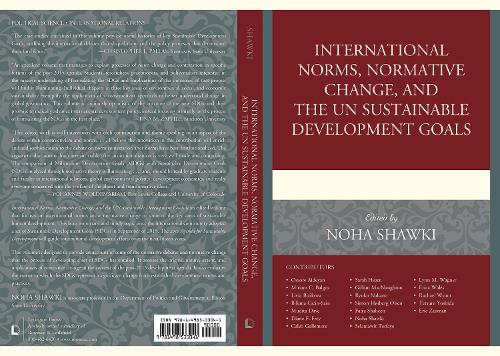
International Norms, Normative Change, and the UN Sustainable Development Goals
(Paperback)
Available Formats
Publishing Details
International Norms, Normative Change, and the UN Sustainable Development Goals
By (Author) Noha Shawki
Contributions by Osaore Aideyan
Contributions by Miriam C. Balgos
Contributions by Livia Bizikova
Contributions by Biliana Cicin-Sain
Contributions by Mudita Dave
Contributions by Diane F. Frey
Contributions by Caleb Gallemore
Contributions by Sarah Hearn
Contributions by Gillian MacNaughton
Bloomsbury Publishing PLC
Lexington Books
31st August 2018
United States
Classifications
Professional and Scholarly
Non Fiction
Development economics and emerging economies
Sustainability
338.927
Physical Properties
Paperback
232
Width 150mm, Height 221mm, Spine 17mm
349g
Description
This book is an edited volume that focuses on international norms and normative change in some of the key areas of sustainable human development. This is an important and timely topic since the international community adopted a set of Sustainable Development Goals (SDGs) in September of 2015. The 2030 Agenda for Sustainable Development will guide international development efforts over the next fifteen years. For this reason, developing a deeper understanding of the SDGs, the international norms that underpin them, and any normative change they represent is vital for students, scholars, and development practitioners and professionals. This volume is designed to provide an account of some of the normative debates and normative change that the process of developing a set of SDGs has entailed. Its goal is to assess the origins, nature, extent, and implications of normative change in the context of the post-2015 development agenda. It also evaluates the extent to which the SDGs represent a significant change from established development norms and practices.
Reviews
This edited work is well interwoven with each contribution and theme speaking to an aspect of the debate within constructivism and norms. The Editor of the volume, Noha Shawki, states: The purpose of this volume is to assess the origins, nature, extent, and implications of normative change in the context of the 2030 Agenda for Sustainable Development. I believe the innovation in this contribution will enrich and add sophistication to the debate on norm contestation after norms have been institutionalized. The argument that norms dont remain stable after institutionalization is very well made and compelling. The comparison of Millennium Development Goals (MDGs) with Sustainable Development Goals (SDGs) analyzed through normative theory is illuminating. This volume is a cutting edge contribution that should be read by graduate students and faculty in International Relations, Global Environmental Politics, Development Economics and really everyone concerned with the welfare of the planet and transformative ideas. -- Yohannes Woldemariam, Fort Lewis College and University of Colorado
An excellent volume that manages to explain processes of norm change and contestation in specific forums of the Post-2015 Agenda. Students, researchers, practitioners, and policymakers interested in the massive undertaking of formulating the SDGs and implications of the outcomes of that process will find it illuminating. Individual chaptersin three key areas of environmental, social, and economic sustainabilityexemplify the application of aconstructivist approach to better understand change in global governance. This volume is cautiously optimistic of the outcome of the new SDGs and their promise to radically advance international development policy, insteadfocusingprimarilyon the process of formulating the SDGs in the first place. -- Tina M. Zappile, Stockton University
The case studies contained in this volume provide useful histories of key Sustainable Development Goals, outlining the international debates that shaped them and the policy processes that determined their final form. -- Christopher L. Pallas, Kennesaw State University
Using insights from Constructivist theory, contributors analyze the emergence and diffusion of environmental, social, and economic sustainability norms. Reaching back beyond the MDGs to trace the initial articulation of these norms, this international group of scholars and practitioners record and assess the negotiation processes of the 17 SDGs or global goals in the 2030 Agenda for Sustainable Development. Engaging and informative, this anthology documents the entrepreneurial role of ordinary citizens and civil society advocates in global diplomacy and is essential reading for students and scholars of global governance and international development at all levels. -- Francine J. D'Amico, Syracuse University
International Norms, Normative Change, and the Sustainable Development Goals provides an insightful look into how norms affected and were affected by negotiations towards a set of sustainable development goals (SDGs) for the post-2015 development agenda. This is valuable reading for anyone who wants to understand the development of the SDGs as well as the process through which norms both shape outcomes and evolve through negotiations for global policy cooperation. In keeping with the breadth of the SDGs themselves, the book explores normative processes within a wide range of policy issues regarding environmental, social, and economic sustainability, presented by experts on topics ranging from protecting the oceans and seas to attaining gender equality to trade and development. This book will definitely have a place on my Model UN syllabus! -- Stacy Taninchev, Gonzaga University
Author Bio
Noha Shawki is associate professor in the Department of Politics and Government at Illinois State University.
